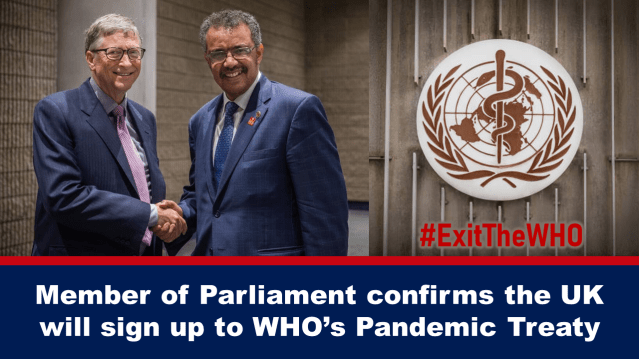Member of Parliament confirms the UK will sign up to WHO’s Pandemic Treaty
Last week, Mark Fletcher, Member of Parliament for Bolsover, responded to a constituent’s email:
“Then Prime Minister Boris Johnson, alongside other world leaders, called for the creation of a pandemic treaty … the current target date for agreeing on the text of the new instrument is May 2024, at the World Health Assembly (WHA) … Over the next year, the UK will continue to work towards building a consensus on how the global community can better prevent, prepare for, and respond to future pandemics,” he wrote.
Fletcher’s reply implies that it is not only a fait accompli but that the UK is very much one of the significant, if not the major, driving forces behind the Treaty.
Many things can be said about Fletcher’s response, not least of all his questionable statement: “A pandemic treaty [ ] would help … prevent a global pandemic, if this were to happen again.” However, in this article, we want to draw your attention, again, to the fact that the Pandemic Treaty is not the only route WHO is pursuing in its quest to impose a global health dictatorship. And, at this time, the Pandemic Treaty is the less urgent of the evils.
We have included a copy of Fletcher’s response at the end of this article.
Let’s not lose touch…Your Government and Big Tech are actively trying to censor the information reported by The Exposé to serve their own needs. Subscribe now to make sure you receive the latest uncensored news in your inbox…
Two weeks ago, in response to a petition, a debate was held in Westminster Hall on the World Health Organisation’s (“WHO’s”) proposed Pandemic Treaty. As the petition and the parliamentary debate had done, many are focusing on the ratification of the ‘Pandemic Prevention, Preparedness and Response Accord’, the so-called “Pandemic Treaty.” However, there are two routes through which WHO is attempting to impose a global health dictatorship. One is the Pandemic Treaty and the other is the amendments to the International Health Regulations (“IHR”).
The two proposals aim to expand an international bureaucracy for health emergencies with an additional annual budget estimated by the World Bank at three times WHO’s current budget. This program is heavily backed by WHO’s major individual and corporate sponsors – entities that will directly benefit through the commodity-centred responses that are proposed.
Why is WHO following two routes and not just one? Because if power and authority over much of the world cannot be gained through amendments to the IHR then WHO will rely on its Pandemic Treaty.
The proposed amendments to the IHR are a completely different set of proposals to the Pandemic Treaty that will not need to be signed into being by any government. For the amendments to be adopted all that is required is a simple majority of the World Health Assembly (“WHA”). WHA can adopt regulations that are legally binding on WHO Member States unless they expressly reject them or “opt out.” The participation of national legislatures or other governmental bodies is not necessary. The Pandemic Treaty, on the other hand, will require a two-thirds majority of the Member States present and voting in the Assembly for it to be adopted.
It is the proposed amendments to the IHR, wholly or in part, that could be adopted at the next WHA meeting in May 2023. Failing that, the IHR amendments could be adopted at the subsequent WHA meeting in May 2024; when the text of the Pandemic Treaty is scheduled to be agreed by Member States.
After reading the draft amendments to the IHR it becomes obvious that the proposed new powers sought by WHO, and the pandemic preparedness industry being built around it, are not hidden. The only subterfuge is the farcical approach of corporate media and politicians in many nations who seem to pretend that the proposals do not exist.
Further reading:
- Why Legislators Should Reject the WHO’s Proposals for Pandemics, Brownstone Institute, 3 April 2023
- The lies, myths and billions of dollars being used to remove our rights and freedoms through WHO’s Pandemic Treaty, The Exposé, 23 December 2022
- Amendments to IHR will enable totalitarianism on a global scale, The Exposé, 28 February 2023
- WHO’s plans to become global health dictator move forward while we’re distracted with “lab leaks” and “lockdown files”, The Exposé, 7 March 2023
- Dictators at WHO aim to begin installing a One World Government under the guise of Global Health Security, The Exposé, 10 March 2023
- WHO is forging ahead with plans to implement a Global Digital Health Certificate, The Exposé, 26 April 2023
Reject WHO’s Proposals
On 13 April, the World Council for Health (“WCH”) issued a policy brief urging the rejection of some of the submitted amendments to the IHR and WHO’s draft pandemic treaty to counter the monopolisation of global health.
“The IHR amendments, if approved, would unduly enhance the powers of the WHO and thus the special interests that exert significant influence over the organisation vis-à-vis states and non-state actors – raising serious questions with regards to state sovereignty and the future of governance. Some amendments represent a framework for the illegitimate exercise of global governmental power without popular accord, constitutional control mechanisms or accountability. As such, they create a dangerous precedent if passed,” WCH’s expert group wrote.
The group added: “The pandemic treaty, if adopted, would create a new, cost-intensive supranational bureaucracy and impose an ideological framework under which to operate in matters of global health. This ideological framework includes support for gain-of-function research with pandemic potential pathogens (PPPs) – despite a human-engineered virus likely being the cause of the covid pandemic that led to the death of about 6.8 million people – and encourages a globally coordinated effort to counter dissent from the official WHO line.”
Melissa Fleming, Deputy Secretary-General of the UN, stated the following belief at a 2022 World Economic Forum meeting in Davos: “We own the science and we think that the world should know it.”
The WCH policy expert group issues a stark warning that any undue concentration of power in the hands of a few or a supranational body without a popular mandate, accountability and constitutional control mechanisms to restrain it, by nature, leads to abuse of power, undermines and compromises democratic processes, corrupts science, curtails choice, suffocates competing solutions, thereby reducing quality and innovation, and enables control over the flow of information as well as stifling of dissent.
The WCH expert group also points to the fact that the WHO is a compromised organisation that only controls about a quarter of its own budget. The rest are earmarked contributions from a few high-income states and powerful private interest groups. Handing more power to the WHO, at this point, equals handing more, not less power to the special national and corporate interests that have impeded effective responses to global health emergencies in the past.
WCH Issues Policy Brief to Counter the WHO’s Monopolisation of Global Health, World Council for Health, 13 April 2023
After reading the WCH’s policy brief, and/or some of the resources we noted earlier in our article, read Fletcher’s reply below and decide for yourself whether Fletcher represents: his constituents and UK citizens’ interests; or, supranational and corporate interests.
Response from Mark Fletcher MP
Mark Fletcher, Member of Parliament for Bolsover, 25 April 2023
Thank you for your email regarding the World Health Organisation and the Pandemic Preparedness Treaty. In March 2021, then Prime Minister Boris Johnson, alongside other world leaders, called for the creation of a pandemic treaty that would help organise and streamline future efforts to prevent a global pandemic, if this were to happen again.
The current target date for agreeing on the text of the new instrument is May 2024 at the World Health Assembly (WHA). This is made up of representatives of World Health Organization [sic] Member States, including the UK.
Over the next year, the UK will continue to work towards building a consensus on how the global community can better prevent, prepare for, and respond to future pandemics and will actively shape, develop and negotiate the text.
It must be noted that no treaty can bind future Governments to act under the authority of a non-governmental organisation. Parliament is, and will always remain, sovereign and retains its right to control all decisions taken in the UK. The signing of this treaty will not mean that the UK loses control of its own laws or decision-making powers.
While I understand that some people are concerned about the effects that the signing of this treaty will have, I believe that many of these concerns are not well-founded and do not accurately represent what this treaty will entail. This is an important step in ensuring the safety of the public both in the UK and around the world.
Thank you again for taking the time to email me. If I can be of any further assistance, please do not hesitate to contact me.
Yours sincerely,
Signed Mark Fletcher

This article has been archived for your research. The original version from The Exposé can be found here.


